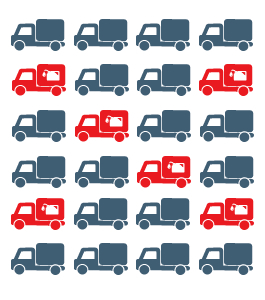The Freight Transport Association of Ireland (FTAI) has welcomed a new government policy initiative to reduce carbon emissions and cut greenhouse gases. In late 2013, the minister with responsibility for Public and Commuter transport announced a public consultation process to prepare a Low Carbon Roadmap for the Transport Sector. Alan Kelly TD said the plan to cut greenhouse gas emissions will run to 2050.

Human activity and industrialisation are believed to be responsible for the upwards trend in global average temperatures that scientists have observed. Gases like carbon dioxide and methane go into the atmosphere and help to make the whole planet warmer. The gasses are created by agricultural activity, power generation and transport as well as domestic activity by the world's population, estimated to be over 7 billion people today. Scientists fear that a changing climate leads to extreme weather conditions, flooding, crop failure, seasonal shifts and dangerous weather events like intense storms, drought and harsh winters.A massive worldwide effort is under-way to reduce Carbon emissions to help prevent climate change.
The new government plan will attempt to anticipate the changes and obligations that will arise out of the shift to a low-carbon economy. With 28% of the total greenhouse gas emissions, most of it CO2 from diesel, transport has a large contribution to make in reducing the amount of greenhouse gases pumped into the atmosphere every year. Under the low carbon regime taking shape, countries will be required to monitor emissions and keep them below a certain level. There will be financial penalties built into a carbon reduction scheme which is a risk to any businesses that are not improving their efficiency in every way possible.
Measuring the scale of the problem and monitoring progress will require an investment in technology at the fleet and national level.Business will need to build this new cost into their strategy plan fleet management accordingly.However, the FTAI has already adopted a policy framework to address emissions. Some of the key initiatives it recommends to lower carbon dioxide are:
- - Increasing fuel efficiency
- - Maximising vehicle payload
- - Minimise empty running
- - Vehicle inspection to measure and improve vehicle efficiency
- - Compare fleets to determine best practice
- - Use of fuels less carbon intensive such as biofuels and electric power
- - Training to improve eco-friendly driving techniques
One of the main policy tools is increased taxes on carbon-based fuel. This spurs manufacturers and operators to develop low-carbon fuel systems to reduce their costs. Measuring the scale of the problem and monitoring progress will require an investment in technology at the fleet and national level.
Technology can also help to maximise fuel through better way-finding, load management, avoiding congestion and crisis response. Carbon-reduction techniques will have to be introduced over a relatively rapid time frame and continue to develop in the years ahead. The prognosis is so dire and the problem so widespread that new measures are required between the countries, industries and people of the world to address the issue. It's a mistake to describe the effect of pollution from greenhouse gas as “global warming” when “climate change” is more accurate. Whatever it is called, there will be no room for a “business as usual approach” to emissions.



